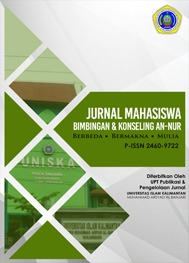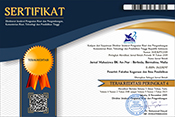APLIKASI CYBER COUNSELING-NGOBROL YUK BERBASIS ANDROID (WHATSAPP) UNTUK MENINGKATKAN PSYCHOLOGICAL WELL-BEING SISWA SEKOLAH DASAR
(1) Universitas Negeri Jakarta
(2) Universitas Negeri Jakarta
(*) Corresponding Author
Sari
This study aims to make it easier for counseling teachers to describe a model of online counseling services. BK teachers are required to be able to provide good and best service through the guidance and counseling process. Developments in Information and Communication Technology (ICT) can be utilized in cyber counseling and handling various services, currently almost all students have cellphones which on average can be used to build systems by optimizing cyber counseling applications based on Android (whatsapp) to improve psychological well-being of elementary school students. The development of communication in the era of digital technology helps provide counseling services more broadly. In the digital era, counseling is not only in the form of face-to-face meetings, but it can be done using the internet network with several applications such as Facebook, Twitter, Instagram, WhatsApp and various other types of applications. This counseling model is also called cyber counseling. This research method is a descriptive method, which aims to obtain an overview of the object of research. Retrieval of data by giving questionnaires to students about student responses to the application of online counseling which consists of two choices (yes / no). To determine the results of student responses to the implementation of online counseling, statistical analysis using presentation techniques was used. The effectiveness of this counseling is measured from student responses which are proven that students feel comfortable, relieved, easy to use the application, helped to solve the problems they face, and Back motivated to continue to achieve goals. Therefore, the cyber counseling-chat application based on Android (whatsapp) to improve students' psychological well-being should be used as a model for counseling services for elementary school students in the digital era effectively.
Kata Kunci
Teks Lengkap:
PDFReferensi
Anggreni, N. M. S & Immanuel, A.S. (2019). School Well Being adalah Sekolah Impianku. Vol.5 No. 12 Juni 2019. ISSN 2477-1686. [Online]. Diakses dari https://buletin.kpin.org/index.php/home/95-vol-5-no-12-juni2019/428-school-well-being-adalah-sekolah-impianku.
Arista, D. A. dkk. (2017). Aplikasi Cyco (Cybercounseling) Sebagai Salah Satu Alternatif Model Konseling di Sekolah. Seminar Nasional BK FIP-UPGRIS. 230–238.
Budianto, A.E., Hidayah, N., & Aziz, A. (2019). Aplikasi Cyber Counseling Dengan Mengoptimalkan Whatsapp Berbasis Komputasi Mobile. Kurawal - Jurnal Teknologi, Informasi Dan Industri, 2(2), 182–193. DOI: https://doi.org/10.33479/kurawal.2019.2.2.182-193
Cahyo, N., & Wibowo, H. (2017). Bimbingan Konseling Online. Jurnal Ilmu Dakwah, 36(2). https://doi.org/10.21580/jid.36i.2.1773
Chikmah, A. M., & Fitrianingsih, D. (2018). Pengaruh durasi penggunaan gadget terhadap masalah mental emosianal anak pra sekolah di tk pembina kota tegal. Siklus: Journal Research Midwifery Politeknik Tegal, 7(2), 295-299.
Chusna, P. A. (2017). Pengaruh media gadget pada perkembangan karakter anak. Dinamika Penelitian: Media Komunikasi Penelitian Sosial Keagamaan, 17(2), 315-330.Euis Ulfah Nurjanah, (2020) Kecenderungan Psychological Well-Being Anak Sekolah Dasar Sebagai Dasar Pengembangan Program Bimbingan Dan Konseling: Studi Deskriptif di SDN 1 Kayuambon Lembang Tahun Ajaran 2019/2020. S1 thesis, Universitas Pendidikan Indonesia.
Crescentini, C., Capurso, V., Furlan, S., & Fabbro, F. (2016). Mindfulness-oriented meditation for primary school children: Effects on attention and psychological well-being. Frontiers in Psychology, 7(JUN), 1–12. https://doi.org/10.3389/fpsyg.2016.00805
Devcich, D. A., Rix, G., Bernay, R., & Graham, E. (2017). Effectiveness of a Mindfulness-Based Program on School Children’s Self-Reported Well-Being: A Pilot Study Comparing Effects With An Emotional Literacy Program. Journal of Applied School Psychology, 33(4), 309–330. https://doi.org/10.1080/15377903.2017.1316333
Gladding, S. T. (2012). Konseling profesi yang menyeluruh. Jakarta: Indeks.
Ifdil, I., & Ardi, Z. (2013). Konseling online sebagai salah satu bentuk pelayanan e-konseling. Jurnal Konseling dan Pendidikan, 1(1), 15-22.
Kartadinata, S. (2011). Menguak Tabir Bimbingan Dan Konseling Sebagai Upaya Pedagogis. Bandung: UPI Press.
Kirana, D. L. (2019). Cyber Counseling Sebagai Salah Satu Model Perkembangan Konseling Bagi Generasi Milenial. Al-Tazkiah: Jurnal Bimbingan dan Konseling Islam, 8(1), 51-63
Kuncoro, Mudrajad , 2001, Metode Kuantitatif (Teori dan Aplikasi untuk Bisnis dan Ekonomi), Unit Penerbit dan Percetakan AMP YKPN, Yogyakarta
Liddle, I., & Carter, G. F. A. (2015). Emotional and psychological well-being in children: the development and validation of the Stirling Children’s Well-being Scale. Educational Psychology in Practice, 31(2), 174–185. https://doi.org/10.1080/02667363.2015.1008409
Maloney, J. E., Lawlor, M. S., Schonert-Reichl, K. A., & Whitehead, J. (2016). A Mindfulness-Based Social and Emotional Learning Curriculum for School-Aged Children: The MindUP Program. 313–334. https://doi.org/10.1007/978-1-4939-3506-2_20
Prahesti, Y., & Wiyono, B. D. (2017). Pengembangan Website Konseling Online Untuk Siswa Di Sma Negeri 1 Gresik. Bk Unesa, 7(3), 144–154.
Roeser, R. R., & Zelazo, P. D. (2012). Contemplative Science, Education and Child Development: Introduction to the Special Section. Child Development Perspectives, 6(2), 143–145. https://doi.org/10.1111/j.1750-8606.2012.00242.x
Sutijono, S., & Farid, D. A. M. (2018). Cyber counseling di era generasi milenial. SOSIOHUMANIKA, 11(1), 19-32
Tanrikulu, I. (2009). Counselors-in-training students’ attitudes towards online counseling. Procedia - Social and Behavioral Sciences, 1(1), 785–788
Wirawan, I. M. A. dan Ratnaya I. G. (2011). Pengembangan Desain Pembelajaran Mobile Learning Management System pada Materi Pengenalan Komponen Jaringan. Jurnal Penelitian dan Pengembangan Pendidikan. 5(3). 314-324.
Zhu, X., Tian, L., Zhou, J., & Huebner, E. S. (2019). The developmental trajectory of behavioral school engagement and its reciprocal relations with subjective well-being in school among Chinese elementary school students. Children and Youth Services Review, 99(September 2018), 286–295. https://doi.org/10.1016/j.childyouth.2019.01.024
DOI: http://dx.doi.org/10.31602/jmbkan.v9i3.11435
Refbacks
- Saat ini tidak ada refbacks.
Akun Akademik Anda Terhubung dengan :
Didedikasikan Untuk:
Jurnal Mahasiswa BK An-Nur : Berbeda, Bermakna, Mulia disseminated below Lisensi Creative Commons Atribusi 4.0 Internasional.
















